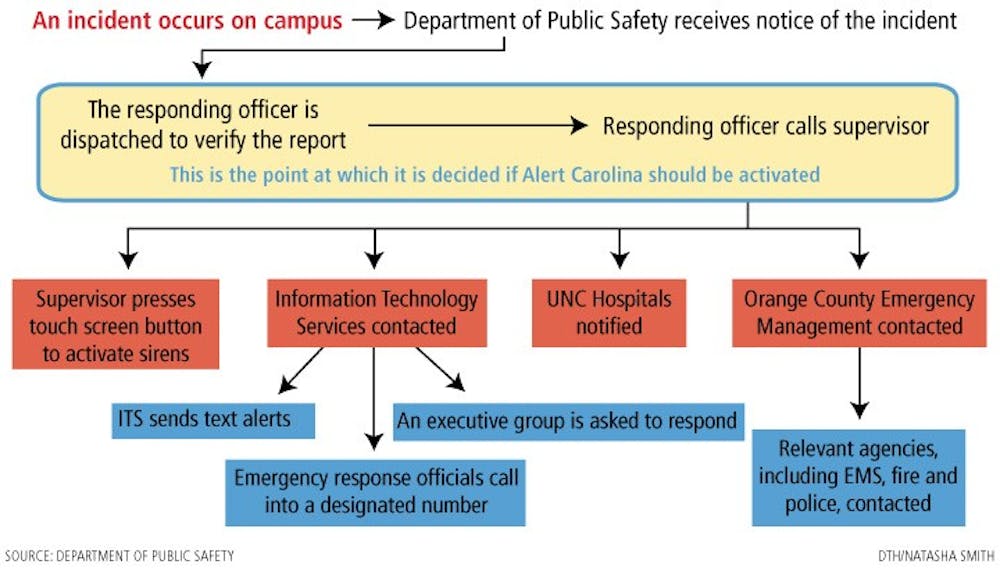Jeff McCracken, chief and director of campus police, said the criticism has amounted to a mandate for a new protocol, one that does not respond to an imminent threat but rather to an incident like last week’s robbery that draws considerable attention and merits outreach more direct than a post on the Alert Carolina website.
Under the current policy, messages are delivered to Orange County emergency management, UNC Hospitals and ITS in the event of an emergency. Emergency officials and Executive Group members receive instructions to call a phone number for instructions on whether to gather in a control center.
McCracken said an instructional text urging the campus to take precautionary measures acts as an alternative to the full-fledged siren and mass-text emergency response. He said a new protocol could come in the form of a text that is informational — rather than instructional — for threats that fall short of the “imminent” threshold.
“My take is that it’s kind of a gap in the current policy,” said McCracken, who will meet with the group today. “If the consensus of the (Executive Group) is that there needs to be another category that addresses not a passive posting of information but sending out of text, we need to come up with parameters.”
Those parameters are anticipated to be some of the most troublesome aspects of the review, as officials determine how to respond to particular threats without saturating the community with alerts and diminishing the system’s effectiveness.
“I don’t want a situation where every time a crime happens, a campus text goes out,” McCracken said.
“I don’t think the campus wants that either. We need to set the parameters for what merits a text and abide by them.”
A three-staged policy similar to the one raised by McCracken is already in place at UNC Hospitals.
In the event of an armed gunman on-campus, officials weigh DPS’s notification before determining the appropriate course. The hospital’s current emergency response ranges from a measure as drastic as a lockdown for a gunman on site to an informational message to patients and employees for a nearby threat.
Dalton Sawyer, the hospital’s director of emergency preparedness, said he is satisfied with the current Alert Carolina policy and echoed McCracken’s call to avoid sending too many alerts.
“The staff can become numb to it, and the reaction will be blunted,” he said. “You can’t ring the bell every time there’s a possibility.”
Morning quarterbacking
To get the day's news and headlines in your inbox each morning, sign up for our email newsletters.
Carney and Winston Crisp, vice chancellor for student affairs, said they wish an administrator had been notified the night of the incident.
“There’s always some Monday morning quarterbacking to think about whether the judgments were the right judgments,” Crisp said. “We’re trying to determine what people thought at the time that things were handled the way they were.
“In hindsight, would I have preferred to be notified as it was going on? Yes.”
Freshman Quinn Matney’s report of a hate crime — later determined to be false — will be considered in the context of the armed break-in and the overall concerns, Crisp said.
“Both still raise the question of at what point and with what amount of information do we need to be notifying the greater community,” he said. “I don’t think this issue changes the need for us to have some discussion.”
Carney said he wished Crisp or another student affairs official were better involved at the time of the armed robbery.
“They’re the people who understand the issues,” he said. “It was in a dormitory, after all.”
Lessons from the past
Larry Conrad, vice chancellor for Information Technology Services, said he will draw from past mistakes during the review.
“Let’s not make the same mistakes with the email system,” he said. “We’re cranking out mass emails all the time it seems like. We hear regularly from people who say ‘Stop spamming us.’ It’s to the extent that if they can take themselves off the listserv voluntarily, they opt out.”
After a January test, Conrad said some students were frustrated by the Alert Carolina messages. Texts were sent to more than 48,000 registered cell phones in less than seven minutes during the test. More than half of the phones belonged to students.
Conrad said the University should consider developing a class structure for incidents, with notification methods specific to each category. But he urged caution, saying UNC should be wary of drastic action.
“I think we have to be very careful that we don’t break something that isn’t broken,” Conrad said.
Contact the University Editor at university@dailytarheel.com.



